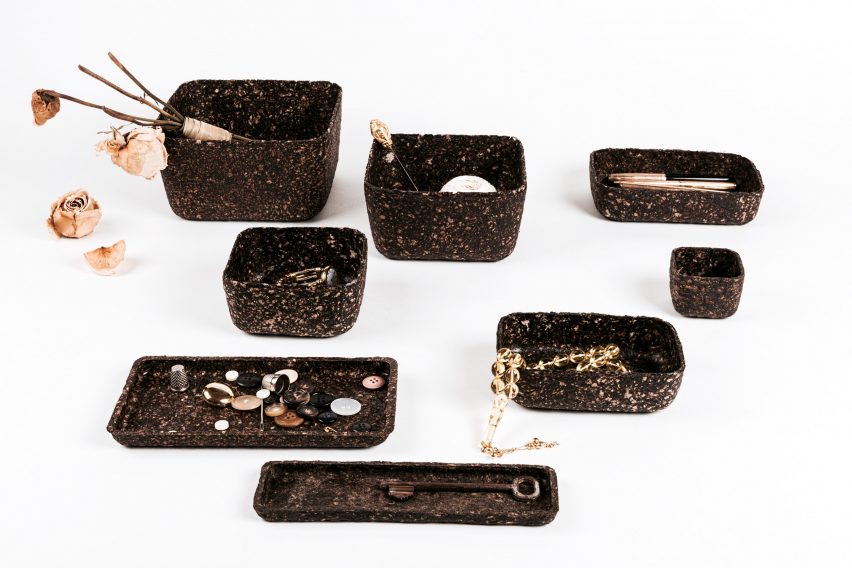After a crisis that saw rubbish pile up in the streets of Beirut, local designers were inspired to use the waste around them as a resource. Here are eight recycled projects that showcase their ingenuity.
The recycled and upcycled projects were shown at this year's Beirut Design Week, the second held since the so-called trash crisis began in 2015.
"Outside this window you could see a garbage mountain that was about 400 metres high, just across the river," designer Ieva Saudargaite says in our feature about how the crisis has motivated local practitioners. "You see that every day and you're like, I don't want to contribute any more waste."
Read on for a selection of eight of the best recent recycled projects from the Lebanese capital.
Morning Ritual by Paola Sakr
Paola Sakr's biodegradable containers are made of coffee grounds and pulped old newspapers – hence the project name, Morning Ritual. "We often generate waste before our day even begins," Sakr points out.
Individual vessels in the series have slightly different colours and smells – a result of the various coffees used.
Concrete tiles by Guillaume Credoz
Guillaume Credoz is an architect and designer particularly interested in new digital manufacturing techniques and recycled materials. As part of collective Beirut Makers' exhibition during the design week, he exhibited tiles made from 3D-printed concrete that incorporates 40 per cent recycled glass and construction rubble.
Credoz is also currently working on developing a 3D-printing process that uses 100 per cent recycled plastic – a big challenge because the plastic needs to be completely cleaned of debris before it can be extruded.
Nationmetrix by Roula Salamoun and Ieva Saudargaite
For their first collaboration, architect Roula Salamoun and artist Ieva Saudargaite created the Nationmetrix installation – a spatial representation of what it's like to cross borders with a Lebanese passport, particularly given recently added travel restrictions to the US and UK.
Cords of recycled plastic hang from the ceiling in a "heat map" arrangement, with dense clusters representing areas of hostility towards Lebanese travellers and sparser areas representing free movement. It is accompanied by an audio element.
Green Glass Recycling Initiative – Lebanon
The Green Glass Recycling Initiative – Lebanon (GGRIL) was actually born before the trash crisis in November 2013, but has gained momentum since. Its founder, Ziad Abichaker, of organisation Cedar Environmental, saw that the country's only green glass manufacturing plant had been destroyed in the 2006 Israel–Hezbollah War, and that the millions of bottles it had previously been recycling were ending up in landfill.
At the same time, traditional glass-blowing was a dying craft, with its remaining practitioners in the ancient city of Sarafand struggling to make a living. GGRIL helps solve both problems by supplying glass-blowers with used bottles and new homeware designs to work on. The glass-blowers are said to have had more work in one year making GGRIL designs than they had for the previous five years combined.
Waste Studio
Waste Studio is another of Beirut's older recycled design projects. Its first product, from 2006, was the Kees el Dekkaneh (aka Grocery Bag), a large tote bag made from advertising banners.
Since the trash crisis, the studio has diversified its range and now makes more than 35 different products – including satchels, duffles, clutches and laptop sleeves – and works with several kinds of recycled materials.
Power of the Nap Addicts by Guillaume Credoz
Another project by Credoz, Power of the Nap Addicts was presented at last year's Beirut Design Week but made a reappearance this year in the KED exhibition venue's rooftop bar and in front of the Sursock Museum.
The lounger's aluminium components are made from recycled cooking pans, while the seat is reclaimed wood. The materials are weather-resistant, making the furniture good for outdoor use.
Ecoboards by Cedar Environmental
When it is not rescuing waste bottles for glass-blowing, Cedar Environmental works on a number of other zero-waste projects, including these green walls constructed from Ecoboards – which are made using recycled plastic bags.
"The panels are fully waterproof, last for hundreds of years and have all the right properties to handle soil, water and roots," Cedar Environmental founder Ziad Abichaker told Dezeen. Most recently, he has used the same Ecoboards for street recycling bins, "using waste to manage waste so no more waste is produced".
Civvies
Civvies is a fashion design studio that views plastic waste as a resource. Still in its early days since being founded in 2016, the studio works with polyester made from recycled plastic, as well as natural linen.
It showcased its new collection during Beirut Design Week at Beirut Creative Space's Open House Event.

